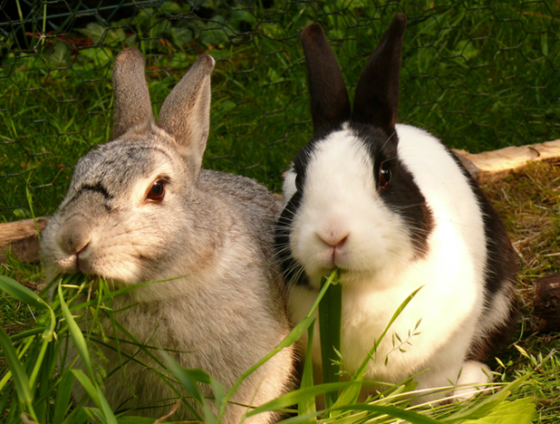Rabbits have not been spared from the current global viral fury as they also battle the onslaught of a virus that causes Rabbit Hemorrhagic Disease (RHD). This virus, just like the Covid-19, was also first reported in China in 1984 and has since spread to many parts of the world.
There are two known strains of RHD virus; RHDVa and RHDV2, with the latter emerging in France in 2010 and has since spread rapidly worldwide. Subsequently, there were reported outbreaks in Australia and New Zealand in 2015.
Early this year, this disease spread to the USA causing several deaths of both native and exotic rabbit breeds. RHD had never been reported in Ghana until the third quarter of 2019 when rabbit farmers across the country complained of sudden increased deaths in rabbits showing bleeding from natural orifices among other lesions.
Veterinary investigations on affected farms, necropsies and molecular laboratory diagnostic techniques assisted to unravel this new outbreak in Ghana.
This disease records in excess of 90% death rate and if left unchecked, will cripple the booming rabbit industry in Ghana.
How does RHD spread?
The virus is very stable in the environment with several modes of transmission. The major means of spread is direct contact with bodily fluids such as urine, feces, nasal and oral discharges of an infected rabbit.
The virus can survive approximately three months in infected carcasses. Thus, countries that import large numbers of rabbit meat can end up getting the virus introduced into the country through infected consignment.
Scavengers such as vultures feeding on contaminated carcasses also act as vectors thereby further spreading the virus. Aside, birds, blood sucking insects and humans, especially farmers, spread the virus as basic biosecurity measures are neglected on farms.
Practices including unrestricted access to farms, absence of foot baths and borrowing of tools and equipment from other farms, serve as a perfect route for entry and spread of the virus, in and among farms.
Recovered rabbits continue to shed the virus for as long as two months and would need to be isolated even after recovery to avoid spreading to others.
Rainy and breeding seasons of birds and insects that transmit the virus have also been recorded to favor disease distribution outbreaks.
What are the clinical signs of RHD?
The disease presents itself in varying forms based on the strain of the virus. Averagely, the incubation period ranges from hours to five days. The most common sign for RHDVa is sudden death followed by bleeding from the natural orifices. Some rabbits show signs of fever, fatigue, depression and death.
In RHDV2, more chronic signs such as lethargy, progressive loss of weight and generalized jaundice are observed. Death in RHDV2 is mainly attributed to liver dysfunction.
How can the rabbit farm be protected from RHD?
Recent outbreaks have greatly affected the rabbit industry in Ghana. Since there is no effective treatment for this disease, prevention and control is imperative.
Biosecurity measures such as keeping premises secured, avoiding entry of unauthorized persons and providing a foot bath at the entrance of the premises must be strictly observed.
In uninfected farms, the source of feed, bedding materials, equipment etc. must be checked since these can serve as fomites. Visitors should not be allowed to handle rabbits, if needed they must wash their hands with soap/detergents thoroughly before doing so.
New arrivals must be quarantined for 30 days under strict monitoring. Dedicated workers should first handle existing rabbits, wash hands and change clothes before handling under quarantine.
Generally, apparently healthy animals should be handled before sick ones. Daily routine activities must start with the young rabbits before adults. Strict sanitation measures such as washing and disinfection of feeders, drinkers and premises must be frequent, and manure removed regularly.
Virkon S, Bleach and Anigene HLD4V have been proven to be effective disinfectants against the virus hence are recommended. As much as possible, farmers are advised to practise an all-in-all-out system of farming.
There is equally the need for active surveillance systems to identify suspected cases and promptly intervene to avoid further spread of the virus. Farmers are encouraged to always contact a veterinarian early anytime they see signs of ill health in their flock.
All animal farmers should keep numbers of district veterinarians on their phones in times of need.
Authors: Drs. William Tasiame, YesutorSoku, EkuaEsuon Thompson, Victor Frimpong, Ewurabena Ntiamoah Bediako and Benjamin Kissi Sasu
Latest Stories
-
Livestream of proceedings as NDC challenges High Court’s order for election re-collation
11 minutes -
UPSA postpones Vice-Chancellor’s investiture amid alleged legal challenges
59 minutes -
China to build world’s largest hydropower dam in Tibet
1 hour -
NPP Yendi chairman suspends 184 members for breach of constitution
1 hour -
Ghanaian media making strides despite challenges – Mercy Adjabeng commends progress
2 hours -
Ablakwa blows whistle on ADB’s $750K ‘Midnight Contract’ amid transition tensions
2 hours -
Elon Musk’s ‘social experiment on humanity’: How X evolved in 2024
2 hours -
At least 69 migrants dead after boat sank off Morocco on Dec. 19, Mali says
3 hours -
Telecel Ghana Foundation’s Healthfest impacts over 400 residents in Techiman
3 hours -
EPA issues alert over Harmattan induced air pollution
3 hours -
South Korea votes to impeach acting president Han Duck-soo
3 hours -
Supreme Court to hear NDC’s challenge against High Court-ordered election re-collation today
4 hours -
The Nigerian watch-lover lost in time
5 hours -
At least 10 killed after Nigerian military jet targeting bandits bomb civilians
5 hours -
Regional challenges cost Egypt around $7bn of Suez Canal revenues in 2024, Sisi says
5 hours

